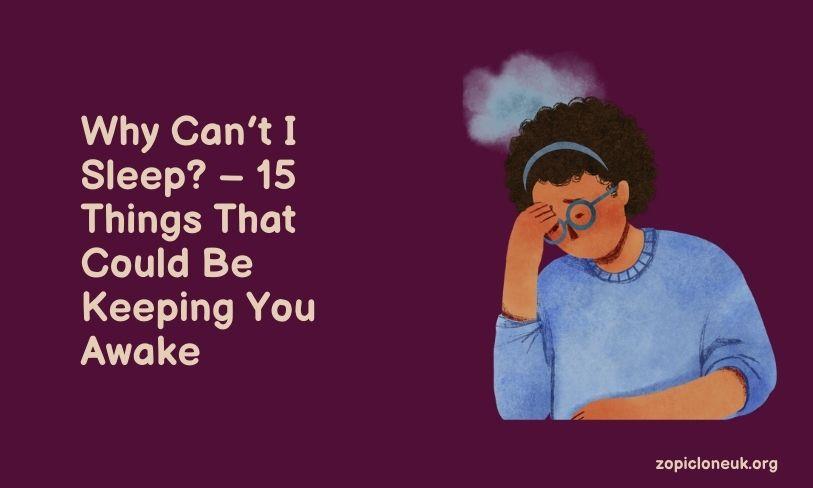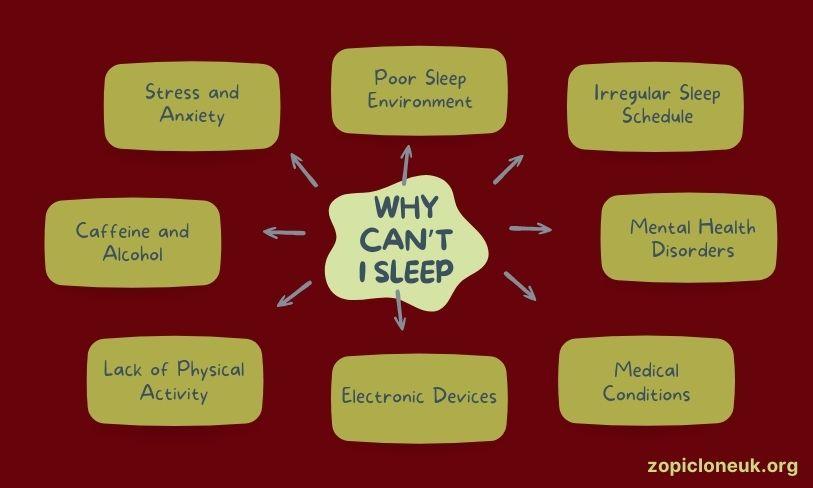
Why Can’t I Sleep? – 15 Things That Could Be Keeping You Awake:- Are you struggling to fall or stay asleep? You’re not alone. Many people experience difficulties with sleep, which can significantly impact their quality of life. Understanding the reasons behind your sleeplessness is the first step toward addressing the issue. Here are 15 reasons you might be having trouble sleeping and what you can do about them.

Contents
- 0.1 1. Stress and Anxiety
- 0.2 2. Poor Sleep Environment
- 0.3 3. Irregular Sleep Schedule
- 0.4 4. Caffeine and Alcohol
- 0.5 5. Lack of Physical Activity
- 0.6 6. Poor Diet
- 0.7 7. Electronic Devices
- 0.8 8. Medical Conditions
- 0.9 9. Medications
- 0.10 10. Hormonal Changes
- 0.11 11. Mental Health Disorders
- 0.12 12. Nicotine
- 0.13 13. Shift Work
- 0.14 14. Napping
- 0.15 15. Aging
- 0.16 Conclusion
- 0.17 FAQ
- 1 Author Details
1. Stress and Anxiety
Stress and anxiety are among the most common causes of insomnia. When your mind is racing with worries or fears, it can be challenging to relax enough to fall asleep. Stress activates the body’s fight-or-flight response, increasing adrenaline and other stress hormones that keep you alert. Techniques like mindfulness meditation, deep breathing exercises, and cognitive-behavioral therapy (CBT) can help manage stress and improve sleep quality.
2. Poor Sleep Environment
Your sleep environment plays a crucial role in your ability to fall and stay asleep. Factors such as noise, light, and temperature can all disrupt sleep. Make sure your bedroom is dark, quiet, and cool. Consider using earplugs, blackout curtains, or a white noise machine to create an optimal sleep environment.
3. Irregular Sleep Schedule
Keeping an irregular sleep schedule can confuse your body’s internal clock, making it harder to fall asleep and wake up at consistent times. Aim to go to bed and wake up at the same time every day, even on weekends. This consistency helps regulate your circadian rhythm and improves sleep quality.
4. Caffeine and Alcohol
Caffeine and alcohol are known sleep disruptors. Caffeine is a stimulant that can keep you awake if consumed too close to bedtime. Similarly, while alcohol might make you feel sleepy initially, it can disrupt your sleep cycle later in the night. Try to avoid caffeine in the afternoon and limit alcohol consumption, especially in the hours leading up to bedtime.
5. Lack of Physical Activity
Regular physical activity can promote better sleep by reducing stress and tiring the body. However, exercising too close to bedtime can have the opposite effect, as it raises your heart rate and body temperature. Aim for at least 30 minutes of moderate exercise most days, but try to finish your workout at least a few hours before bed.
6. Poor Diet
What you eat can significantly affect your sleep. Heavy, spicy, or fatty meals can cause discomfort and indigestion, making it difficult to fall asleep. Try to have your last meal at least a few hours before bedtime and choose light, healthy snacks if you’re hungry in the evening.
7. Electronic Devices
The blue light emitted by phones, tablets, and computers can interfere with your body’s production of melatonin, a hormone that regulates sleep. Limit screen time in the hour leading up to bed and consider using blue light filters on your devices. Establishing a relaxing bedtime routine that doesn’t involve screens can also help signal to your body that it’s time to wind down.
8. Medical Conditions
Several medical conditions can cause insomnia, including sleep apnea, restless legs syndrome, and chronic pain. If you suspect a medical issue is affecting your sleep, consult with a healthcare professional for a proper diagnosis and treatment plan.
9. Medications
Certain medications can interfere with sleep. These include stimulants, some antidepressants, corticosteroids, and medications for high blood pressure or asthma. If you think your medication might be affecting your sleep, talk to your doctor about possible alternatives or adjustments to your dosage.
10. Hormonal Changes
Hormonal fluctuations, such as those experienced during menopause, pregnancy, or menstrual cycles, can impact sleep. For example, hot flashes during menopause can cause night sweats that disrupt sleep. Hormonal treatments and lifestyle adjustments, such as cooling your sleeping environment, can help manage these symptoms.
11. Mental Health Disorders
Mental health disorders, including depression, anxiety, and bipolar disorder, can significantly affect sleep patterns. These conditions often lead to either excessive sleepiness or insomnia. Addressing the underlying mental health issue through therapy, medication, or a combination of treatments is crucial for improving sleep.
12. Nicotine
Nicotine is a stimulant that can interfere with your ability to fall asleep and stay asleep. If you’re a smoker, try to avoid smoking in the evening and consider seeking help to quit smoking altogether, which can improve both your sleep and overall health.
13. Shift Work
Shift work can disrupt your natural sleep-wake cycle, especially if your shifts rotate frequently or you work night shifts. To mitigate the impact of shift work on your sleep, try to keep a consistent sleep schedule, even on days off, and use blackout curtains or a sleep mask to simulate nighttime conditions when sleeping during the day.
14. Napping
While short naps can be refreshing, long or irregular napping during the day can negatively affect your nighttime sleep. If you need to nap, try to keep it to 20-30 minutes and avoid napping late in the afternoon.
15. Aging
As we age, our sleep patterns naturally change. Older adults tend to have more fragmented sleep and may wake up more frequently during the night. To improve sleep quality as you age, focus on maintaining a consistent sleep schedule, creating a comfortable sleep environment, and staying physically active.
Conclusion
Sleepless nights can be incredibly frustrating, but understanding the potential causes of your insomnia is the first step toward finding a solution. By addressing the factors that might be keeping you awake, such as stress, poor sleep environment, or irregular sleep schedules, you can improve your chances of getting a good night’s sleep. Remember that making lifestyle changes, seeking medical advice when necessary, and being patient with yourself are all important parts of the process.
FAQ
Q: How can I create a better sleep environment?
A: Ensure your bedroom is dark, quiet, and cool. Use blackout curtains, earplugs, or white noise machines to minimize disruptions.
Q: Is it okay to use electronic devices before bed?
A: It’s best to avoid screens an hour before bedtime as the blue light can interfere with melatonin production. Use blue light filters if necessary.
Q: What should I do if I suspect a medical condition is affecting my sleep?
A: Consult with a healthcare professional to get a proper diagnosis and treatment plan tailored to your needs.
Q: Can exercise help me sleep better?
A: Yes, regular physical activity can improve sleep quality, but try to finish exercising at least a few hours before bedtime.
Q: How does aging affect sleep?
A: Older adults may experience more fragmented sleep and frequent awakenings. Maintaining a consistent sleep schedule and staying active can help.
Author Details




Medical content by qualified psychiatrists
Our editorial policy

Zopiclone precautions Read our potential abuse notice

Looking for a seller? Locate the best Zopiclone vendor






